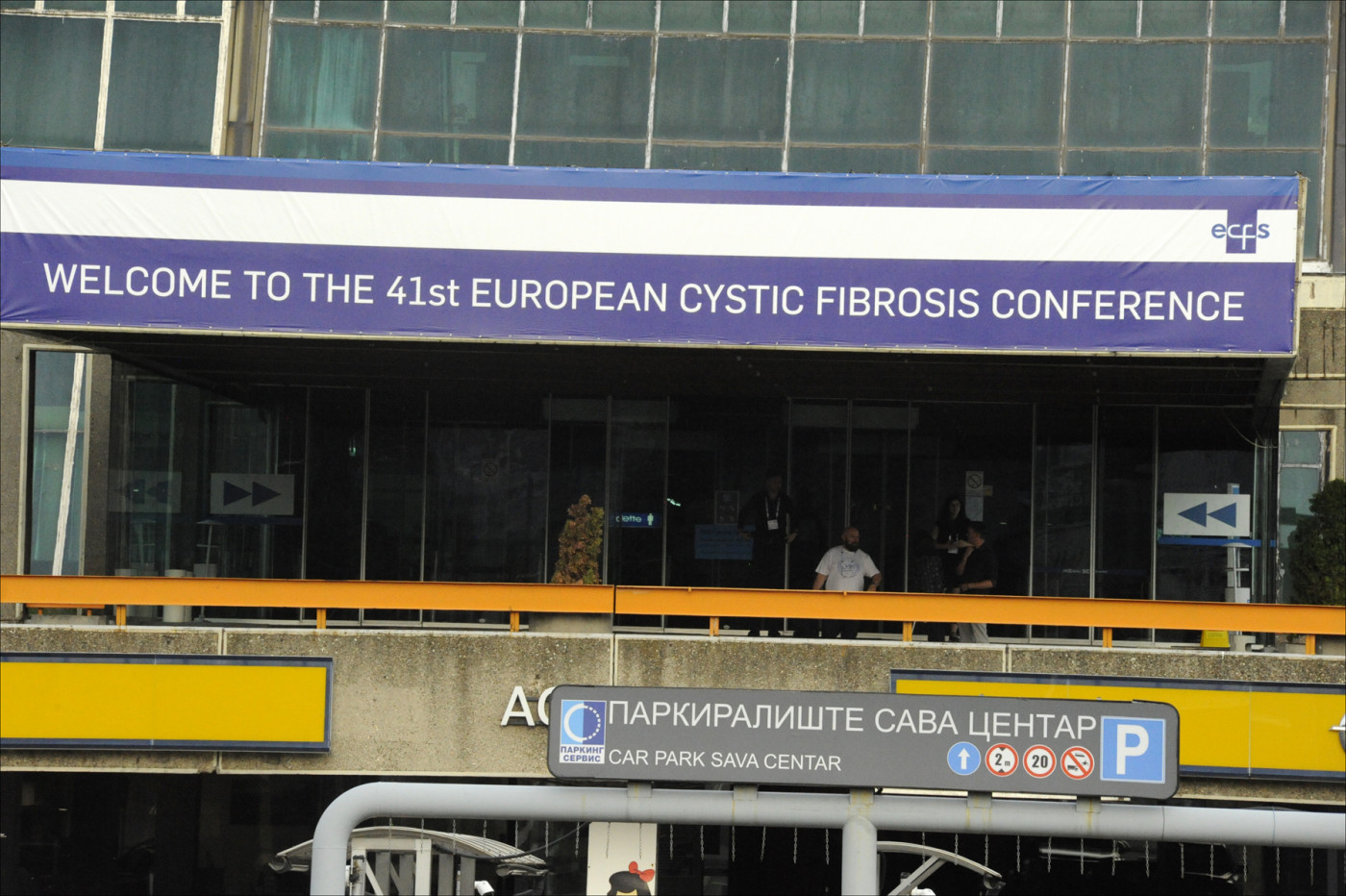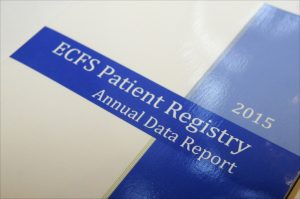#ECFS2018 — Addressing Mental Health Issues Important for Cystic Fibrosis Patients, Experts Say

Sava Centar in Belgrade, Serbia, welcomes delegates to ECFS 2018. (Photo by Larry Luxner)
Anxiety and depression among cystic fibrosis (CF) patients — and their parents — is far more common than most people realize, according to a panel of experts at the recent 41st European Cystic Fibrosis Conference (ECFS) in Belgrade, Serbia.
The discussion featured eight mental health experts, and focused on efforts to implement screening programs among CF patients worldwide.
According to a 2015 study, “International Committee on Mental Health in Cystic Fibrosis: Cystic Fibrosis Foundation and European Cystic Fibrosis Society consensus statements for screening and treating depression and anxiety,” published in the journal Thorax, the prevalence of depression ranges from 8 to 29 percent among children and adolescents with CF, and from 13 to 33 percent among adult CF patients.
“Risk for suicide is a core component of depression, is a major cause of death among adolescents and adults in the general population, and in the CFF Registry data, 1.6 percent of deaths were categorized as explicit suicide,” the authors of the study wrote.
British psychologist Janice Abbott, PhD, said a recent survey of 108 CF centers across Europe revealed that half of them already had screening programs in place, and that 6,000 CF patients and 2,000 caregivers had been seen by mental health professionals. This resulted in 550 treatment referrals and 84 urgent referrals for suicide intervention.
“Respondents said it was much easier to initiate mental health conversations, and that screening creates a greater awareness of mental health for both patients and caregivers, and destigmatizes mental health issues,” said Abbott, who is affiliated with the University of Central Lancashire, U.K.
Polish psychologist Renata Zubrzycka presented her analysis of depression among parents of CF children. She compared 126 parents (96 moms and 30 dads) of children with CF against 130 parents (100 moms and 30 dads) of kids without CF. She found that parents of CF children “have a significantly higher intensity of depressive symptoms” than parents of healthy kids — and that no correlation exists between depression and income levels.
Marieke Verkleij, a child psychologist at a CF treatment center in Amsterdam, Netherlands, spoke about the practical complexities of managing mental health in CF.
“We’re screening for anxiety and depression, but we also offer clinical assessments for all parents and teenagers. We’ve been doing this for many years,” she said. “They come for 45 minutes. I speak with adolescents, and now we have combined this with screening questionnaires. We discuss the results and we give advice.”
Verkleij found that parents of teenage CF patients — especially fathers — report more stress.
“There are also participants who refuse treatment,” she said. “In some cases, we tell them they need some help, and we try to motivate them. But we still have a population who does not want to seek help. We have to investigate all barriers to reach them.”
Ivana Lalic, who runs a CF clinic in Zagreb, Croatia, said her center has 22 patients registered, whose mean age is 24. Their body mass index and pulmonary function were measured, and they completed both the Patient Health Questionnaire (PHQ-9) and the Generalized Anxiety Disorder Assessment (GAD-7) to monitor the severity of depression and anxiety.
According to GAD-7 results, 82% of the patients were found to have minimum depression and 18% had moderate depression. The PHQ-9 found that 59% had minimum depression and 41% moderate depression, Lalic said.
Yet mental health issues often affect caregivers as well as the patients themselves.
Pediatric respiratory physician André Schultz of Perth Children’s Hospital in Australia noted that “unresolved grief can be an underlying driver for mental health issues in parents of children with chronic illness” — and that poor parental mental health discourages their kids from adhering to treatment plans.
Schultz’s team screened parents of CF kids in metropolitan Perth for unresolved parental grief (UPG), anxiety, depression and stress, and found UPG in 47 percent of those tested.
“Depression is definitely linked to [poorer] survival,” he said. “Some of these parents think to themselves, ‘Why make them do the treatments, because they’re going to die on me anyway,’ and that’s not the truth anymore.”









